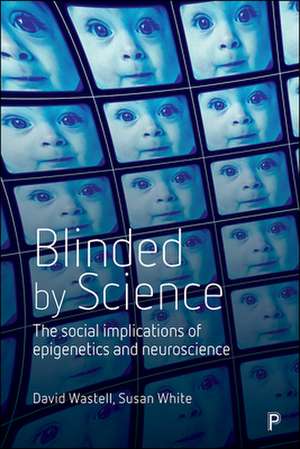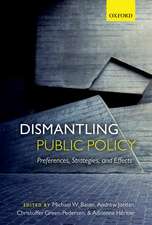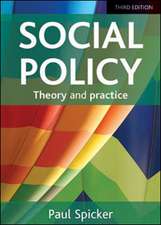Blinded by Science: The Social Implications of Epigenetics and Neuroscience
Autor David Wastell, Susan Whiteen Limba Engleză Paperback – 14 mar 2017
There’s no hotter area of science, at least as far as the general media and laypeople are concerned, than neuroscience—every day we hear of dramatic, surprising discoveries that seem to have the potential to utterly change our understanding of how the mind works. This book offers the first thorough review of such claims and the new biological science behind them. It examines the actual and potential applications of neuroscience within social policy and the impact of neuroscientific discoveries on long-standing moral debates and professional practices throughout social work, mental health practice, and criminal justice.
| Toate formatele și edițiile | Preț | Express |
|---|---|---|
| Paperback (1) | 339.82 lei 3-5 săpt. | |
| Bristol University Press – 14 mar 2017 | 339.82 lei 3-5 săpt. | |
| Hardback (1) | 777.97 lei 6-8 săpt. | |
| Bristol University Press – 14 mar 2017 | 777.97 lei 6-8 săpt. |
Preț: 339.82 lei
Nou
Puncte Express: 510
Preț estimativ în valută:
65.02€ • 68.07$ • 53.80£
65.02€ • 68.07$ • 53.80£
Carte disponibilă
Livrare economică 15-29 martie
Preluare comenzi: 021 569.72.76
Specificații
ISBN-13: 9781447322344
ISBN-10: 1447322347
Pagini: 256
Dimensiuni: 159 x 235 x 20 mm
Greutate: 0.45 kg
Editura: Bristol University Press
Colecția Policy Press
ISBN-10: 1447322347
Pagini: 256
Dimensiuni: 159 x 235 x 20 mm
Greutate: 0.45 kg
Editura: Bristol University Press
Colecția Policy Press
Notă biografică
David Wastell is professor emeritus of information systems at the University of Nottingham. Susan White is professor of social work at the University of Sheffield and a registered social worker.
Cuprins
List of figures and tables
Acknowledgements
Preface
Part I: Getting to grips with the thought styles
One Biology and the drive for human improvement
Two How knowledge gets made in neuroscience and molecular biology
Three Blaming the brain
Part II: Fixing real people
Four The precarious infant brain
Five The cat is out of the bag: from early intervention to child protection
Six Perfecting people: the inexorable rise of prevention science
Seven Epigenetics: rat mum to my Mum?
Eight Human epigenetics prematurely born€?
Nine Are we broken? Fixing people (or society) in the 21st century
Appendices
Appendix A: Signs and codas
Appendix B: The amygalda: the brain’s almond
Appendix C: Statistical primer
Appendix D: The definition of autism spectrum disorder (ASD)
Appendix E: Critique of Cunha et al, 2010
References
Index
Acknowledgements
Preface
Part I: Getting to grips with the thought styles
One Biology and the drive for human improvement
Two How knowledge gets made in neuroscience and molecular biology
Three Blaming the brain
Part II: Fixing real people
Four The precarious infant brain
Five The cat is out of the bag: from early intervention to child protection
Six Perfecting people: the inexorable rise of prevention science
Seven Epigenetics: rat mum to my Mum?
Eight Human epigenetics prematurely born€?
Nine Are we broken? Fixing people (or society) in the 21st century
Appendices
Appendix A: Signs and codas
Appendix B: The amygalda: the brain’s almond
Appendix C: Statistical primer
Appendix D: The definition of autism spectrum disorder (ASD)
Appendix E: Critique of Cunha et al, 2010
References
Index
Recenzii
"This book provides a wealth of information and helpful analysis. . . . I would strongly recommend that readers buy this book and share with colleagues."
"Too often early childhood policy is founded on dogmatic interpretations of over-simplified science. Skepticism is the antidote, which this remarkable piece of scholarship provides, bringing ethical concerns to the fore."
"Forensically detailed, compelling and at points unsettling, this book is a very welcome antidote to simplistic policy appropriations of biology. It deserves to be widely read."
















